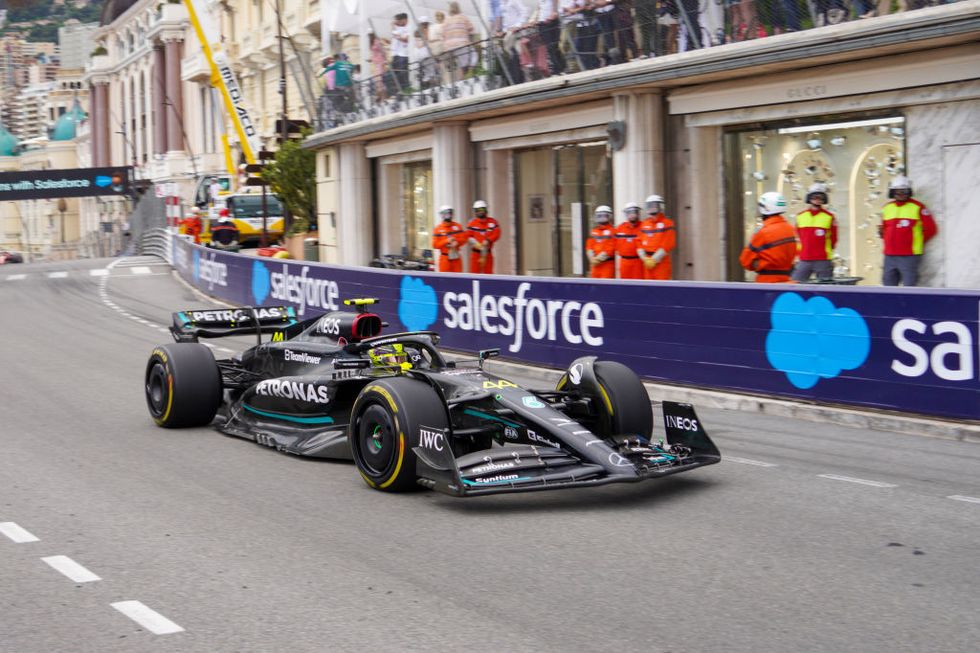- The ABB Formula E series is an all-electric open-wheel motorsport championship with plenty of room for growth in an EV era that is anything but mature.
- Historically speaking, EVs and nine-year-old Formula E are still babies.
- When series co-founders Alejandro Agag and Alberto Longo dreamed up the series, few took the idea of an electric open-wheel series all that seriously.
Jeff Dodds, the new CEO of the ABB FIA Formula E World Championship, has been on the job less than three weeks, but he already feels that he’s found his calling.
The former COO of Virgin Media—part of the Richard Branson empire—replaced Jamie Reigle as the chief executive officer at Formula E on June 5. This Sunday’s race at Portland (Ore.) International Raceway marks his first event weekend on the job.
To say he’s happy to be there would be an understatement.
“My world is one of an intersection between automotive, media and entertainment, sustainability and social progress—something I’m extraordinarily personally focused on,” Dodds told Autoweek. “All those things triangulate beautifully around Formula E. So, sustainable at heart, net zero from day zero, it’s an entertainment sport.
“And also for me, I’ve been in big business for a very long time and in very mature industries—telecom, media,very mature industries. I really wanted to do something where I thought there was massive growth opportunity.”
That’s Formula E in a nutshell. It’s a motorsport series with plenty of room for growth in the midst of an EV era that is anything but mature. Historically speaking, EVs and nine-year-old Formula E are still babies.
“When I look at the potential of Formula E, a business that’s nine years old—and basically two of those years were lost to COVID—and I compare that to Formula 1, which is 70 years old, I look at how far we’ve come in such a short period,” Dodds said. “But I look at how far we’ve got to go in terms of potential. I put all that together and it genuinely feels like this is a perfect job.
“When I announced that I was coming here, every LinkedIn message I got, every WhatsApp I got, from everyone I’ve known, said there isn’t a more perfect job for you.”
This week, Dodds is having flashbacks to his last visit to a Formula E race in the United States. That one was in Brooklyn as a fan in 2019 with his then 14-year-old son. It’s safe to say he’ll be looking at things with a much more critical eye this weekend in Portland, which was a rather late addition to the schedule after construction in the Brooklyn neighborhood that previously hosted Formula E forced Formula E’s hand.
“The fact that New York didn’t become our home doesn’t mean it won’t be our home in the future,” Dodds said. “I’m super-excited about Portland. I’ve talked to the (Formula E) team setting up at Portland and they’re telling me it’s going to be a crackerjack race. The track is brilliant. It’s a wide track, it’s set up for a really exciting race, loads of overtaking. It’s had IndyCar there, NASCAR there and had some exciting finishes. Portland seems like a super-exciting city.”
Earlier this week, even before the first Formula E all-electric open-wheel race car hit the track, the series committed to returning to Portland in 2024. Reading between the lines, however, Portland looks like it might just be a temporary home for Formula E in the U.S.
“I won’t lie to you. Portland is great, but are there other cites, other North American cities, that we might hope to add to our calendar,” Dodds said. “The U.S. market is such a huge market, so important to our teams. So, yeah, we’re exploring places like New York, L.A., Chicago. We’re looking at other big cities. I don’t know how many U.S cities or races we should have, but we’re deep into investigation now.”
The key, Dodds said, is finding cities, race circuits or street courses, that matches the mission. In addition to Brooklyn, Formula E previously raced at Miami and Long Beach in the U.S.
“We shouldn’t land in a city without knowing why we’re there,” he said. “It could be that we’re in a country and in a city because it’s massively important to our manufacturer partners and our team partners. So, that could be North America, that could be China, that could be India. It’s massively important from a scale point of view.
“We might be in a city because they’ve got a big sustainability agenda, and they want us to partner with somebody to use us as a platform to talk about sustainability and to drive that change faster through the city. That would be a bloody good reason for us to be there. But it could also be that they have an incredible motor racing heritage, and it’s a way of underpinning our credentials as an elite motorsport. We’re in Monaco because it brings racing credibility and racing heritage to race the greatest street circuit in the world. Would we look at places like Indianapolis? Of course, because it has great racing heritage.”
Formula E, though less than a decade old, is still trying to establish its own racing heritage. When series co-founders Alejandro Agag and Alberto Longo dreamed up the series and sold the idea to then FIA president Jean Todt, few took the idea of an electric open-wheel series all that seriously. The silent screams of an EV racing engine was a novelty, a curiosity, at best.
Make no mistake about it. The series is here to stay. It’s even got exclusive rights to be the sole EV single-seater racing series under the FIA umbrella until at least 2039. So, while Formula 1 inches toward what appears will be an EV future of its own, Formula E will remain alone in the EV lane for a while.
Of course, NASCAR, NHRA or even IndyCar could be racing EVs well before 2039.
“We’re an elite single-seater racing series,” Dodds said. “If other world-class racing series end up racing electric, not combustion, that’s great for us, because it just brings more profile to the overall electric racing world. So I’m not worried about that at all.
“If we had a Moto GP equivalent—one that was electric and not combustion—I think that would be brilliant for our sport because it just brings more awareness to the fact that you can race electric vehicles.
“The other thing I get is about the performance. The theoretical potential of an electric bike, an electric car is absolutely incredible. That doesn’t necessarily bring you the best type of racing, it just means you can get flat-out performance out of it if you really want to. The other thing that we have to put to bed is that it’s not all about top speed, it’s not all about naught to 60. We can do incredible things with both of those numbers, what we really want is incredible racing.”
Dodds said that he understands the criticism of electric racing. He prefers to look at the bigger picture. Both EV and ICE racing can coexist.
“There is a traditional motorsport cohort that loves the smell of the petroleum, and they love the smell of the tire, and they love the sound of engine, and the roar of the engine,” he said. “Hey, I’ve been there. I love all that. I l0ve Formula 1. I love Moto GP.
“But I also love incredible racing and being able to talk to the person next to me—I love that as well. It’s different audiences, and they’re completely complementary. One doesn’t have to lose for the other to win. Formula 1 can be successful. We can be successful. Moto GP can be successful.
“Moto GP doesn’t have to fail for us to win. Formula 1 doesn’t have to fail for us to win. There’s plenty of room for all of us.
Of course, many like to point out that in 25, maybe 50 years, the internal combustion engine might be looked at as this generation’s horse and buggy. Purists are going to be attending motorsport events and saying, “Hey, remember the days when the roar of the engines at the racetrack was so loud that you couldn’t hear the person next to you?”
To that, Dodds smiles.
“If that’s where we get to,” Dodds says. “You and I will be sitting on the beach sipping piña coladas, because we’ll have won.”

Mike Pryson covered auto racing for the Jackson (Mich.) Citizen Patriot and MLive Media Group from 1991 until joining Autoweek in 2011. He won several Michigan Associated Press and national Associated Press Sports Editors awards for auto racing coverage and was named the 2000 Michigan Auto Racing Fan Club’s Michigan Motorsports Writer of the Year. A Michigan native, Mike spent three years after college working in southwest Florida before realizing that the land of Disney and endless summer was no match for the challenge of freezing rain, potholes and long, cold winters in the Motor City.
Read the full article here



